Articles
- Page Path
- HOME > J Korean Acad Nurs > Volume 43(3); 2013 > Article
-
Original Article
- A Structural Model for Quality of Life of Infertile Women
- Ju Hee Kim, Hye Sook Shin
-
Journal of Korean Academy of Nursing 2013;43(3):312-320.
DOI: https://doi.org/10.4040/jkan.2013.43.3.312
Published online: June 28, 2013
1Department of Nursing, Dankook University, Cheonan, Korea.
2College of Nursing Science, Kyung Hee University, Seoul, Korea.
- Address reprint requests to: Shin, Hye Sook. College of Nursing Science, Kyung Hee University, 26 Kyunghee-daero, Dongdaemon-gu, Seoul 130-701, Korea. Tel: +82-2-961-9143, Fax: +82-2-961-9398, suksh@khu.ac.kr
• Received: October 6, 2012 • Accepted: February 15, 2013
© 2013 Korean Society of Nursing Science
Figure & Data
REFERENCES
Citations
Citations to this article as recorded by 

- The mediating effect of health-promoting behaviors on the relationship between infertility stress and fertility-related quality of life of infertile women: a cross-sectional study
Eun Jin Kim, Ju-Hee Nho, Hye Young Kim
Women's Health Nursing.2025; 31(1): 66. CrossRef - The effects of a lifestyle intervention for men in infertile couples in South Korea: a non-randomized controlled trial
Yun Mi Kim, Ju-Hee Nho
Journal of Korean Academy of Nursing.2025; 55(2): 191. CrossRef - Effectiveness of a couple-based mobile programme in improving human fertility
Soo Kyoung Hann, Hee Sun Kang, Ju Hee Kim
Journal of Reproductive and Infant Psychology.2025; : 1. CrossRef - A Scoping Review of the Effect of the COVID-19 Pandemic on Patients Under Infertility Treatment
Boyoung Jeon, Hongbi Kim, Hye In Jeong
Journal of The Korean Society of Maternal and Child Health.2023; 27(2): 80. CrossRef - Quality of Infertility Care Services and Emotional Health of South Asian Women
Sehar-un-Nisa Hassan, Aqeela Zahra, Nuzhat Parveen, Naveed Iqbal, Sarwat Mumtaz, Asma Batool
Psychology Research and Behavior Management.2022; Volume 15: 1131. CrossRef - The Reliability and Validity of Korean Version of the Infertility Stigma Scale (K-ISS)
Miok Kim, Minkyung Ban
Journal of Korean Academy of Nursing.2022; 52(6): 582. CrossRef - The Mediating Role of Self-esteem between Spousal Support and Infertility-related Stress among Infertile Couples: Actor Effects and Partner Effects
Ka Yeon Lee, Seong Hee Kim
Family and Environment Research.2021; 59(4): 465. CrossRef - Associations of Symptoms of Depression, Social Support, and Quality of Life Among Korean Women Who Experience Infertility
Hyewon Shin, Jungmin Lee, Shin-Jeong Kim, Minjeong Jo
Journal of Obstetric, Gynecologic & Neonatal Nursing.2021; 50(6): e1. CrossRef - Predictive Model for the Quality of Life of Infertile Men
Jummi Park, Nayeon Shin
The Open Nursing Journal.2021; 15(1): 9. CrossRef - The Study of Relationship among Infertility Stress, Gratitude, and Couple Relationship Changes of Women Undergoing Reproductive Treatments
Miok Kim, Jummi Park, Ju-Eun Hong, Minkyung Ban
Journal of The Korean Society of Maternal and Child Health.2021; 25(3): 169. CrossRef - Effects of Mind–Body Programs on Infertile Women: A Systematic Review and Meta-analysis of Randomized Controlled Trials
Ju-Young Ha, Seon-Hwa Ban
Asian Nursing Research.2021; 15(2): 77. CrossRef - A moderated mediation model of perceived stress, negative emotions and mindfulness on fertility quality of life in women with recurrent pregnancy loss
Guopeng Li, Zhenhua Jiang, Xue Han, Xue Shang, Wanli Tian, Xiaofei Kang, Mei Fang
Quality of Life Research.2020; 29(7): 1775. CrossRef - Factors influencing infertility-related quality of life in infertile women
Yun Mi Kim, Ju-Hee Nho
Korean Journal of Women Health Nursing.2020; 26(1): 49. CrossRef - Effects of psychological intervention for Korean infertile women under In Vitro Fertilization on infertility stress, depression, intimacy, sexual satisfaction and fatigue
Miok Kim, So-Hyun Moon, Jee-Ean Kim
Archives of Psychiatric Nursing.2020; 34(4): 211. CrossRef - Effects of uncertainty and spousal support on infertility-related quality of life in women undergoing assisted reproductive technologies
Hye Shin Lee, Sunjoo Boo, Jeong-Ah Ahn, Ju-Eun Song
Korean Journal of Women Health Nursing.2020; 26(1): 72. CrossRef - Effect of resilience on infertile couples’ quality of life: an actor–partner interdependence model approach
Ju-Young Ha, Seon-Hwa Ban
Health and Quality of Life Outcomes.2020;[Epub] CrossRef - Nursing needs assessment scale for women with infertility: development and validation
Jummi Park, Nayeon Shin, Kyungmi Lee
Korean Journal of Women Health Nursing.2020; 26(2): 141. CrossRef - Effects of Irrational Parenthood Cognition, Family Support, and Resilience on Depression of Infertile Women
Eun Young Cho, Mi-Hae Sung
Korean Journal of Women Health Nursing.2019; 25(1): 60. CrossRef - Factors Affecting the Infertility-Related Quality of Life among the Infertility Women
Young Hee Lee, Jung Suk Park
Journal of The Korean Society of Maternal and Child Health.2019; 23(3): 191. CrossRef - A Dyadic Approach to Infertility Stress, Marital Adjustment, and Depression on Quality of Life in Infertile Couples
Ju Hee Kim, Hye Sook Shin, Eun Kyoung Yun
Journal of Holistic Nursing.2018; 36(1): 6. CrossRef - Factors Influencing Infertility-related Quality of Life in Women Undergoing Assisted Reproductive Techniques: Focusing on Depression and Resilience
You Jung Jung, Hye Young Kim
Korean Journal of Women Health Nursing.2017; 23(2): 117. CrossRef - Effects of Irrational Parenthood Cognition, Post Traumatic Stress Disorder and Spousal Support on Quality of Life of Infertile Women
So Ra Yang, Jung Hee Yeo
Korean Journal of Women Health Nursing.2017; 23(2): 145. CrossRef - Psychometric Properties of the Korean Version of the Infertility Self-Efficacy Scale
Ju Hee Kim, Han Jong Park, Jung Ho Kim, Soojin Chung, Hyon Joo Hong
Asian Nursing Research.2017; 11(3): 159. CrossRef - A Phenomenological Study on the Spontaneous Abortion Experiences of Women
Ju-Eun Hong, Jum-Mi Park
Korean Journal of Women Health Nursing.2017; 23(2): 63. CrossRef - Screening for infertility‐related stress at the time of initial infertility consultation: psychometric properties of a brief measure
Giulia Casu, Paola Gremigni
Journal of Advanced Nursing.2016; 72(3): 693. CrossRef - The Mediating Effect of Resilience on Depression and Rehabilitation Motivation in Stroke Patients
Eun Sil Choi, Eun Nam Lee, Jeong Lim Cho
Journal of muscle and joint health.2016; 23(1): 19. CrossRef - Infertility Stress, Depression, and Resilience in Women with Infertility treatments
Miok Kim, Hyuna Nam, Misun Youn
Journal of Korean Public Health Nursing.2016; 30(1): 93. CrossRef - Factors Influencing the Depression Level of Couples Participating in the National Supporting Program for Infertile Couples
Nami Hwang, Insun Jang
Journal of Korean Academy of Community Health Nursing.2015; 26(3): 179. CrossRef
A Structural Model for Quality of Life of Infertile Women
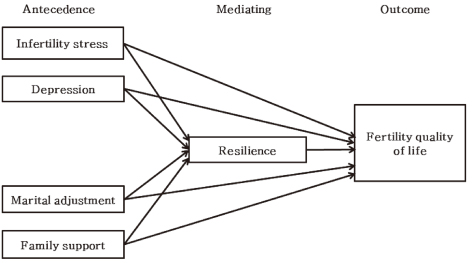
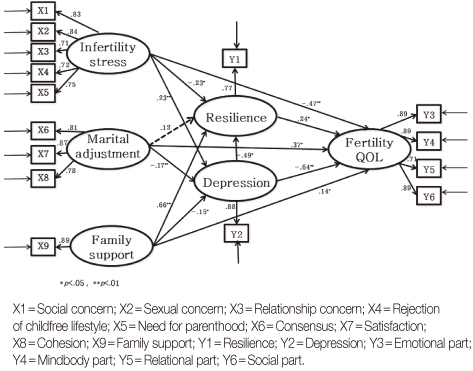
Figure 1
Theoretical framework.
Figure 2
Path diagram for the modified model.
Figure 1
Figure 2
A Structural Model for Quality of Life of Infertile Women
General and Infertility related Characteristics of Respondents (N=203)
AI=artificial insemination; IVF=In vitro fertilization.
General and Infertility related Characteristics of Respondents (N=203)
Estimates and Effects for the Modified Model
SMC=squared multiple correlations.
*p<.05, |t|=1.96; **p<.01, |t|=2.58.
Table 1
General and Infertility related Characteristics of Respondents (N=203)
AI=artificial insemination; IVF=
Table 2
General and Infertility related Characteristics of Respondents (N=203)
Table 3
Estimates and Effects for the Modified Model
SMC=squared multiple correlations. *
 KSNS
KSNS
 E-SUBMISSION
E-SUBMISSION


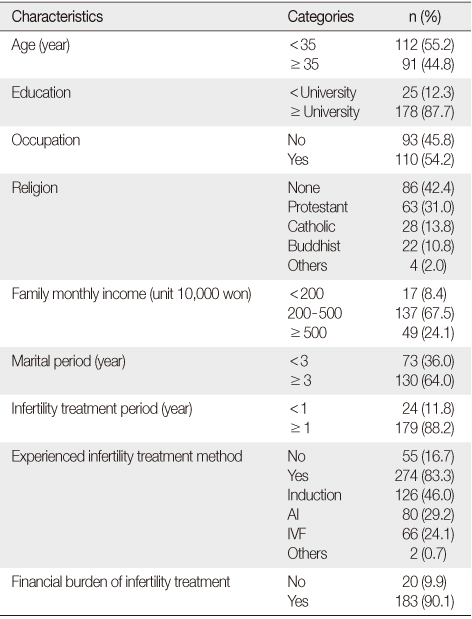
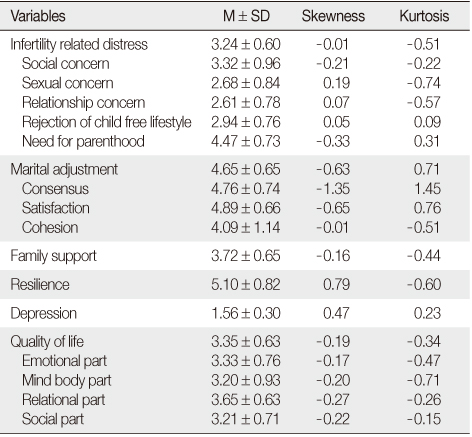
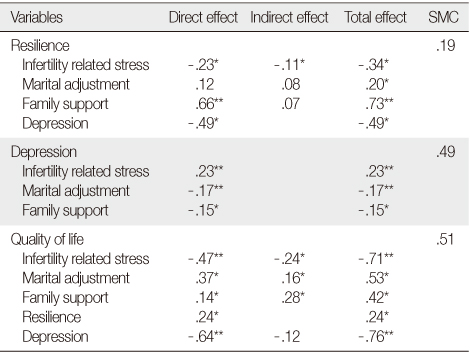
 Cite
Cite

